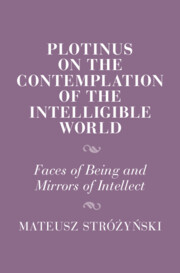Book contents
- Plotinus on the Contemplation of the Intelligible World
- Cambridge Studies in Religion and Platonism
- Plotinus on the Contemplation of the Intelligible World
- Copyright page
- Dedication
- Epigraph
- Contents
- Acknowledgements
- Introduction
- Part I Descent and Fall
- Part II Soul
- Part III Intellect
- Conclusion
- Bibliography
- Index
- References
Bibliography
Published online by Cambridge University Press: aN Invalid Date NaN
- Plotinus on the Contemplation of the Intelligible World
- Cambridge Studies in Religion and Platonism
- Plotinus on the Contemplation of the Intelligible World
- Copyright page
- Dedication
- Epigraph
- Contents
- Acknowledgements
- Introduction
- Part I Descent and Fall
- Part II Soul
- Part III Intellect
- Conclusion
- Bibliography
- Index
- References
- Type
- Chapter
- Information
- Plotinus on the Contemplation of the Intelligible WorldFaces of Being and Mirrors of Intellect, pp. 357 - 364Publisher: Cambridge University PressPrint publication year: 2024



